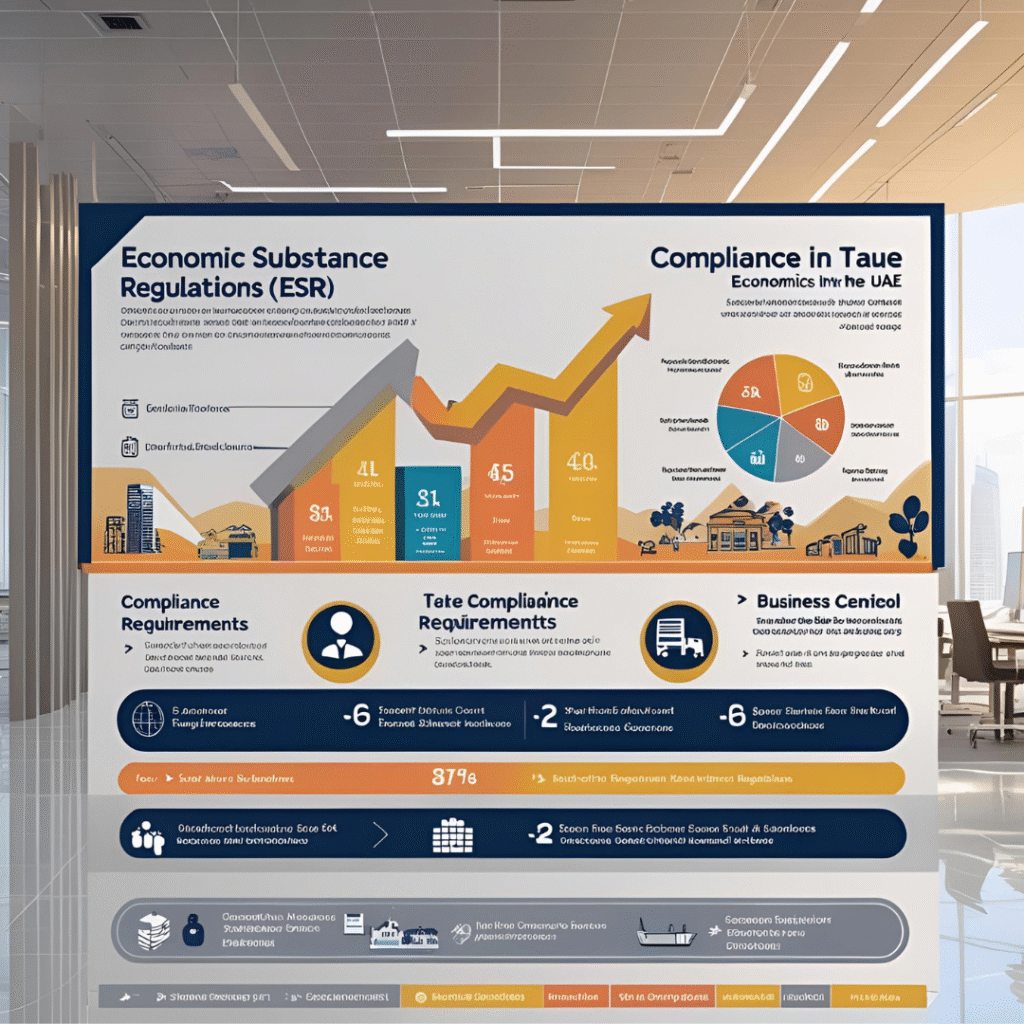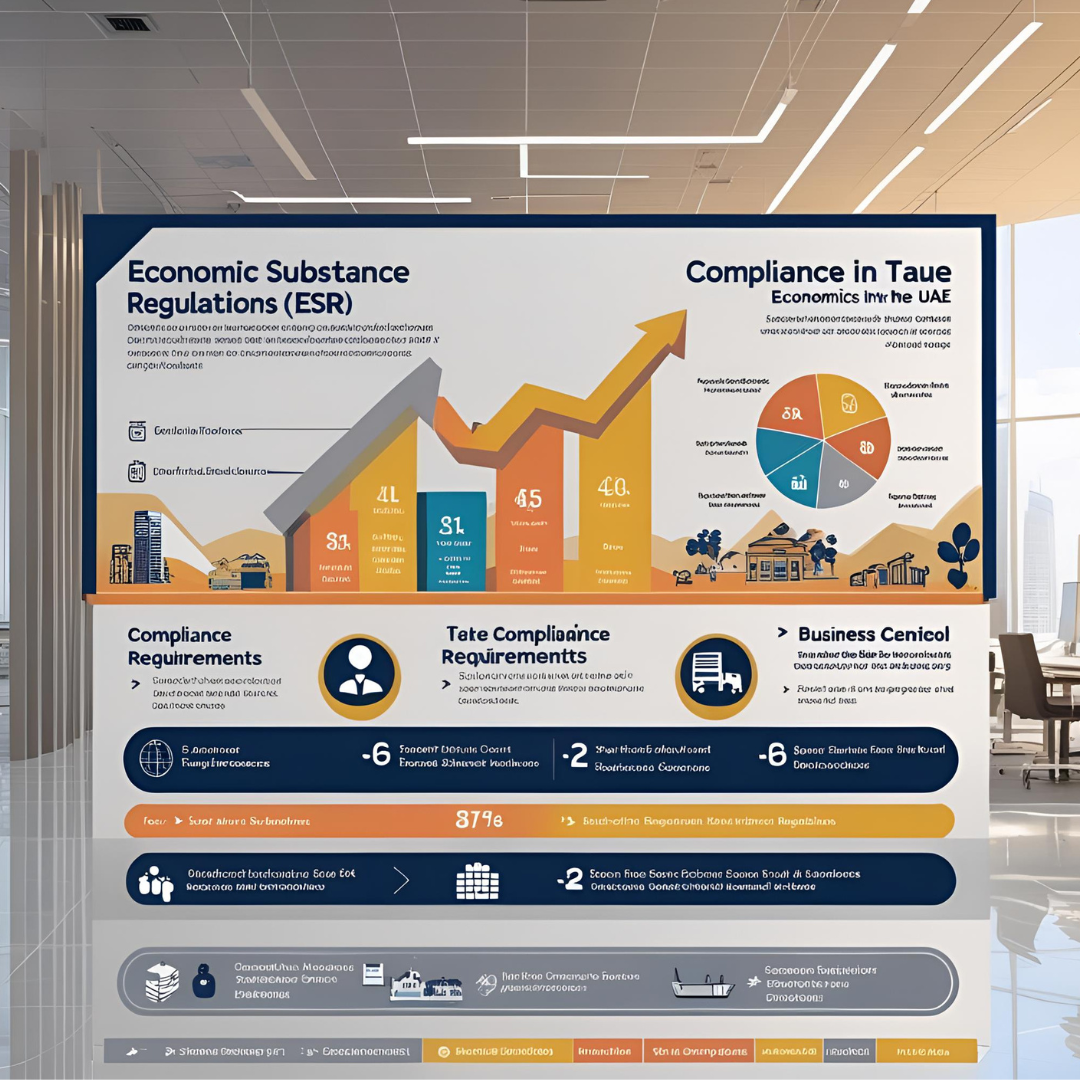Understanding Economic Substance Regulations (ESR) in the UAE

Introduction To maintain its status as a transparent and compliant international financial hub, the UAE introduced Economic Substance Regulations (ESR) in 2019, in line with OECD and EU requirements. These regulations ensure that UAE-based entities with relevant activities demonstrate substantial economic presence in the country.
In 2025, ESR compliance remains a top priority for businesses operating in key sectors. Failure to comply can lead to heavy penalties, license suspension, and reputational damage. This guide explains everything you need to know about ESR in the UAE — who it applies to, how to comply, and what steps to take next.
1. What are Economic Substance Regulations (ESR)? Economic Substance Regulations require entities engaged in certain activities to have actual operations and decision-making within the UAE. The objective is to prevent harmful tax practices like profit shifting or shell companies lacking genuine presence.
The ESR framework includes:
- Annual notification filing
- Economic Substance Report (if applicable)
- Demonstrating economic substance via local operations, employees, expenditure, and governance
2. Who is Subject to ESR? Entities (mainland, Free Zone, and offshore) that conduct any of the following Relevant Activities must comply:
- Banking
- Insurance
- Investment fund management
- Lease-finance
- Headquarters business
- Shipping
- Holding company business
- Intellectual property (IP) business
- Distribution and service centre business
Companies must assess annually if they conduct any of these activities, directly or indirectly.
3. ESR Notification: Annual Requirement All entities must file an ESR Notification within six months from the end of their financial year, declaring whether they conducted a Relevant Activity and earned income from it.
What to Include in the Notification:
- Details of the relevant activity
- Whether income was earned
- Whether the entity is exempt
Filing Platform: Ministry of Finance ESR portal
4. ESR Report: If Income is Earned If the entity conducts a relevant activity and earns income from it, it must submit an Economic Substance Report within 12 months from the end of the financial year.
The report must demonstrate:
- Core Income-Generating Activities (CIGA) conducted in the UAE
- Adequate number of full-time employees (or outsourcing justification)
- Adequate physical premises
- Sufficient operational expenditure in the UAE
Supporting documentation and board meeting minutes held in the UAE must also be submitted.
5. Exempted Licensees Some entities may qualify for exemption if they meet certain criteria. Common exemptions include:
- Investment funds
- UAE branches of foreign companies where income is taxed abroad
- Entities fully owned by UAE residents not part of a multinational group
Even if exempt, such entities must still file the ESR Notification and provide evidence of their exemption.
6. Penalties for Non-Compliance Failure to comply with ESR can result in:
- AED 20,000 penalty for failure to file notification
- AED 50,000 to AED 400,000 for failure to submit accurate or timely reports
- Exchange of information with foreign tax authorities
- Suspension or revocation of trade license
7. ESR Compliance Checklist
| Task | Deadline | Required For |
|---|---|---|
| File ESR Notification | 6 months from financial year-end | All UAE entities |
| Submit ESR Report | 12 months from financial year-end | If income is earned from relevant activity |
| Maintain Board Resolutions | Ongoing | All entities under ESR |
| Demonstrate CIGA in UAE | Ongoing | Applicable entities |
| Retain Supporting Documents | Minimum 6 years | All ESR-subject businesses |
8. Common ESR Mistakes to Avoid
- Not assessing ESR applicability each year
- Missing the filing deadline
- Submitting incomplete or inconsistent data
- Failing to justify outsourcing arrangements
- Treating a holding company as exempt without reviewing income sources
9. Best Practices for ESR Compliance
- Early Assessment: Begin ESR review right after financial year-end
- Board Meetings: Ensure physical board meetings are held in the UAE with proper minutes
- Local Substance: Lease office space, employ local staff, and spend locally
- Use Approved Advisors: Work with licensed ESR advisors to manage documentation and reporting
Conclusion As tax transparency and global reporting standards tighten, ESR compliance in the UAE is no longer optional. Foreign and local businesses alike must understand their ESR obligations and act early to avoid regulatory trouble.
Staying compliant demonstrates that your UAE operation is genuine, active, and aligned with international norms — which helps you maintain reputation, licensing, and investor trust. If you’re unsure whether ESR applies to your business or need help filing, reach out to trusted consultants who can guide you through the process step-by-step.



